- Home
- Michael P. Spradlin
The Enemy Above Page 3
The Enemy Above Read online
Page 3
Several times he thought he saw something odd and nearly called out in alarm. But each time, the mysterious lurker proved to be only a tree or bush, not a waiting Nazi. Whenever it happened, Anton felt foolish. But he forced himself to remain vigilant.
Finally, Uncle Dmitri pulled the reins and the wagon came to a stop.
“We’re here.”
Anton was confused. They were in an open meadow, with only a small copse of trees and a pile of boulders nearby. There were no buildings, no cabins, not even a tent. Could his uncle be lost?
“I do not understand. Is this it? Are we going to build our shelter?” Anton asked.
“Yes, Anton, this is it. But our shelter is already built,” Dmitri said.
“But there is nothing here,” Anton said.
“You will see. You and Bubbe will remain here with the supplies, while Sergei and I gather more food,” Dmitri said, helping Bubbe down from the wagon seat.
“But we will not be safe out here in the open,” Anton insisted.
“Patience, Anton,” Dmitri said. “Follow me.”
Sergei remained with the wagon. Dmitri took Bubbe by the arm, leading her toward the rock formation, which stood about forty meters off the road.
Anton followed along, carefully picking his steps in the darkness. He could not imagine how his uncle could consider this a safe place.
Then they arrived at the boulders and he understood. Two of the giant rocks tipped against each other. There was a small space between them. It was the opening to a cave.
Dmitri led them inside. They had to descend a small slope, but eventually the floor leveled out. Once safely inside, a match was struck and an oil lamp lit, illuminating the faces of at least twenty people. All of them had come for the same reason. Their cheeks were streaked with dirt. Their eyes were tired, their expressions laced with worry.
But for the moment they were safe.
Anton studied the group in the flickering light of the lamp. He knew many of them, but there were faces he’d never seen. He counted twenty-eight in the band. Six of them were men about his uncle’s age. The rest were women and children. And off to the side of the group, Anton noticed one solitary boy who looked about his age.
Dmitri motioned to the men to help him empty the wagon of supplies.
Bubbe stood before the rest of the group, leaning on her walking stick. She studied their tired faces. Anton knew she was exhausted. But she straightened herself and thumped her walking stick on the floor of the cave two times. Anton could not help but smile.
“Some of you I recognize,” she began. “You, Rina, your father was Levi Rosen?” The woman nodded and smiled. “You were a teenager the last time I saw you. We will all be getting well acquainted with one another soon enough. I know you are tired and scared. But we will conquer our fear. For the time being, we are safe. We have shelter, food, and each other. All of you have left your homes, your communities. We will make a new community here. God will watch over us. With his guidance all of us have made our way here on this night. What we have, we share. We will care for the children, take turns cooking, and turn this cave into a home. The men will go out looking for food each evening. We can only hope the darkness will keep them hidden. When they return in the daytime, we will stand watch so they can rest.
“There is one more thing we must all remember. If we are discovered, we are to gather north of here, near Verbata. There is another underground place called the Priest’s Grotto. It isn’t close and the journey would be dangerous. But the countryside is full of farmers who will help us. Do not forget the Priest’s Grotto. It will not be easy. But when have our lives ever been easy?”
She paused and looked at each face in turn. “United, we are stronger than we are alone. Now, let us all work together so we may get settled in and make our shelter more inviting. But first let us all introduce ourselves to one another. I am Erica Schostak. This handsome boy is my grandson, Anton.” She raised her walking stick and pointed it at Anton. His face flushed red. The women chuckled. And one by one they said their names. Rosen. Grossman. Weiss. Birnbaum. Serniov. Fetisov. By then, two of the children had fallen asleep on a pile of blankets. With the introductions done, everyone sprang to work. Rina took Bubbe by the arm, led her to a small stool, and helped her sit. She left Bubbe there a moment before returning with a cup of water.
Anton took a moment to study the cave. The oil lamps they’d brought made shadows dance and flicker across the cavern floor. The limestone walls were dark and grooved in places where water had seeped through the ground. Anton thought it must have taken centuries for the water to erode the rock. But the cave was warm and reasonably dry, even if it smelled like wet dirt.
He felt Bubbe’s hand on his shoulder. She had left her seat. “Anton,” she said. “This is Daniel. His father is in the army, like yours.”
“Hello,” Anton said.
“Hello,” Daniel replied.
Bubbe motioned to Dmitri and the other men who had returned with the rest of the wagon’s supplies. “I am sure the two of you can help make the cave more comfortable. Anton, why don’t you introduce Daniel to your uncle?” Bubbe said. She used the tone of voice he had heard many times before. It meant that he had no choice in the matter.
Anton smiled at Daniel. “I guess we’re going to be friends.”
Daniel nodded his head nervously. He didn’t say much as Anton led him to Uncle Dmitri. And true to Bubbe’s word, they were both given a list of chores.
Anton looked around their new home with apprehension. The entrance to the cave may have been a narrow tunnel, but once through it, the main chamber was large and open with little nooks where a person might find some solitude. Toward the back of the cavern, tunnels led off in many directions. The cave was dark. And the light of the oil lamps was swallowed up quickly. The farther back they ventured, the stronger the smell of wet dirt became. Anton supposed they would get used to it. As he’d noticed earlier, the walls of the cave were damp, but he did not hear the sound of a stream or river. What would they do for water, he wondered? He supposed they would need to carry it in from the outside.
“Do not venture too far down the passageways or tunnels,” Uncle Dmitri warned them. “These caves go on for many kilometers with dozens of twists and turns. It would be easy to become hopelessly lost. But should we be discovered, this maze will work to our advantage. If the gestapo, the SS, or the Ukrainian secret police ambush us, you must scatter and hide. Hurry down the tunnels as far as you can. The darkness will be your friend. Discovery is unlikely—we are well hidden here. But it is best to be prepared.”
Suitably warned, Anton and Daniel went to work. They stacked burlap bags of vegetables and baskets of bread. Then they grabbed several bales of hay and helped the younger girls finish making straw mattresses for everyone.
“Can you show me how to do this?” Daniel asked a small girl with dark hair and big eyes. “Your mattresses look much more comfortable than mine. Whoever gets this one isn’t going to sleep very well, I’m afraid.”
The little girl, Lena, giggled. “Like this,” she demonstrated.
Daniel was good with the children, Anton observed. He had them joking and laughing and soon they were making a game out of their work. Racing to see who could make the most mattresses. Anton soon realized the girls were all developing crushes on Daniel. Anton was somewhat awestruck. He was far too shy around girls, even young ones.
As he worked, Anton began to realize that people had been toiling in the cave for quite a while. Someone must have known about this place and set it up as the perfect rendezvous point if the Germans arrived. Larger alcoves dug and chiseled out by hand dotted the walls so that families could have their own space. A central kitchen area had been built near the back of the main cavern. Someone had even brought a small stove. Several of the women were peeling vegetables and tending to a simmering stew. For a moment, Anton allowed himself to relax. Perhaps this place would be safe.
Once the supplies were sto
red and the spaces divided up, Dmitri called everyone to gather around a single oil lamp.
“We have made a good start today,” he said. “However, this is not a perfect place for us. We do not have fresh water. Which means Sergei, Leonid, Slava, Herman, Yakov, and I will likely need to make several trips out per night in order to bring back enough for all of us. The rest of you will stay behind. Daniel and Anton, it will be your job to keep watch for German patrols. We must not light a fire or the lamps often, only to cook and only in the daytime. Does everyone understand?”
Anton was disappointed. True, he was scared of being captured. But he wanted to go out at night and forage for supplies. He wanted to help, not stay behind as a glorified lookout. He would wait until the time was right and talk to his uncle. He knew where to find food. Even though most of the harvest was done, there were orchards where you could still find fruit. The surrounding fields held shocks of wheat that could be gathered up and ground into flour. He could be useful. That was what he wanted. To make a difference.
The meeting was over. Parents gathered their children and shuffled off to their own small spaces. But Anton noticed that Daniel stood by the lamp, shifting back and forth on his feet.
“Are you alone here?” Anton asked him.
Daniel stared at the ground. “Yes.” He didn’t elaborate, and Anton didn’t press him. Everyone deserved a few secrets. The boy’s face was gaunt and he had dark shadows under his eyes. Clearly, he had not been sleeping or eating regularly for some time. Anton knew there were things that were difficult to put into words. And sometimes, talking only made a person remember what was best forgotten. Daniel would talk when he was ready.
“If you like, there is a space back there big enough for two. We can each drag one of the mattresses back there,” he offered.
“What about your grandmother? Shouldn’t you stay with her?” Daniel asked tentatively.
Anton shrugged. “She snores. Come on. If we’re going to keep watch during the night, we’re going to need to be rested.”
Anton led Daniel to an alcove that was barely wide enough for their two straw mattresses. As they arranged their sleeping quarters, Anton told Daniel about his uncle Pavel and how much he was worried about him. “With my father gone, it is difficult for the family to be separated even further.”
Daniel was quiet for a moment. “I know exactly what you mean,” he said. “My mother—”
Anton noticed Daniel’s jaw clenching tightly. “You don’t have to tell me anything,” he said.
But now that he’d started talking, Daniel wouldn’t be stopped. “My village is just a small place north of Borta. It is hardly a village at all, really. It has a store and a synagogue and a few houses clustered around a crossroads. Not much ever happens there. We farm and worship and live quiet lives. Then the Nazis arrived and our quiet lives were suddenly very noisy. No one knows why they attacked. Usually, they entered a town or village and simply took over. We were peasants. Farmers. We could offer them no resistance.
“Yet they came in with tanks and half-tracks shooting down people in the street. Jews, gentiles, it did not matter. They were filled with bloodlust. Soldiers went from house to house dragging my neighbors outside into the street and gunning them down. Our farmhouse was on the outskirts of the village. My mother and sister and I tried to get away. But my sister was too small to run. I could not carry her. My mother tried, but she was not fast enough. The Nazis caught them. My mother screamed at me to run and hide … and I did. I ran to the fields. I left them. Later, I saw them loaded onto a truck and taken away. I don’t know where. I stumbled upon Sergei and his wagon and he told me about this place.”
Daniel clenched his fists. “I should have fought those monsters. If I were stronger, my family would still be together.”
Anton could see moistness in Daniel’s eyes. He did not know what to say. Only that without hope, Daniel would never survive this awful war.
“I am so sorry. I cannot imagine witnessing such a thing. But think of it. As far as you know your mother and sister are still alive. My bubbe is always telling me that God will provide and watch over us. And he will watch over your family, too …”
“Anton, I mean no disrespect to your bubbe. I’m sure you love her as much as I loved mine. And I mean no disrespect to you, either. But where was God when the Nazis attacked our village? Where was he when they took my mother and sister? Where was God when they shot Mr. and Mrs. Hagerbaumer? They were our village elders. They couldn’t fight. Yet the Germans shot them down like dogs. Where was God then?”
Daniel’s voice was full of anger. Anton did not know what to do. Nothing he could say would make a difference. Perhaps Daniel just needed time. He vowed to listen to him when he talked. Perhaps a friendly ear would help.
“I am sorry,” Anton repeated. “I will pray that your family is safe.”
“What will we do?” Daniel asked. It was a large and loaded question. How were they going to survive? Would they find Daniel’s family? Was either of their fathers still alive? The war could not last forever. If they managed to outlast it, what would the rest of their lives look like if no one was around to help them pick up the pieces?
“I do not know, Daniel,” Anton said. “Bubbe says …” No. This moment wasn’t about his grandmother’s wisdom, or even about his own need to believe that everything would be fine. This was about taking comfort where they could, and forcing themselves to carry on. “I think it is up to us. For now, I think we just try to make it through each day alive.”
Daniel did not answer. Anton lay down on his mattress and in a matter of seconds sleep overtook him.
That night he did not dream.
After the first few days in the cave, a sort of benign boredom set in. At night the men ventured out and returned several times with buckets of water, which were transferred to barrels in the cavern. During the day, a little sunlight crept into the cave’s entrance, but Anton noticed that it didn’t really penetrate the darkness or the gloom. Everyone tried to keep busy, but there wasn’t much they could do without risking discovery. The children couldn’t play loud games. The women cooked only during the day, so no passersby would notice the light of the stove.
Anton and Daniel kept watch each night. But they didn’t see anything suspicious. Yet Anton knew the Germans had overrun the countryside. Patrols were everywhere, Dmitri said. He and Sergei had gone to the river to gather water and had nearly been caught twice. But Anton and Daniel never saw anyone anywhere near the entrance to the cave.
On the fourth day, Dmitri called them to his side.
“I have a mission for the two of you,” he said.
Anton grew excited, but tried not to show it. “How may we help, Uncle?” he asked.
“Our nightly excursions are becoming more dangerous. Last night we were nearly captured yet again. A squad of gestapo followed us, but we lost them in the woods. We led them away from the cave, so it took us twice as long to return. We had to dump out the water we were carrying so we could travel faster.”
He stared solemnly at each boy. “The danger is becoming too grave for us. So tonight while we are out, I want the two of you to explore the cave. Elsa and some of the other women will keep watch.”
“What are we looking for?” Daniel asked.
“A good question, Daniel,” Dmitri said, placing his hand on the boy’s shoulder.
“Two things,” Dmitri said. “The first is to find out if any of the cave’s passageways lead to an underground spring. If we can find a water source in the cave, we will not have to venture out each night. Second, look for another way out of this cave. We need an escape hatch. If we are discovered—if the gestapo should come here—we must have a way to flee.”
He handed a flashlight and a canteen to Anton, and a small bag of bread and fruit to Daniel.
“I thought you said the passageways were full of twists and turns. How will we keep from becoming lost?” Anton said.
Dmitri handed him a rock. It
felt soft and chalky in his hand.
“Use the rock to mark your way. This limestone will leave a visible line on the rock, like chalk. Draw an arrow every fifty steps. If you become lost, you will follow them back to the main cavern. Any questions?”
Anton and Daniel shook their heads, understanding what was required of them.
“We’ll go now,” Anton said. “No time like the present.”
“Good. Be careful. Don’t take any unnecessary chances. Don’t forget that this cave can be dangerous.”
Anton flicked on the flashlight and Dmitri checked his pocket watch. “Go as far as you can in one hour, then turn back. If you do not return in two hours, someone will come looking for you.” Dmitri placed the watch in Anton’s hand and left them, returning to the group warming themselves by the stove.
“Shall we?” Anton said.
“I guess,” Daniel said. “I do not like the dark. I would rather we were hiding in the treetops than in these underground caves.”
Anton knew that Daniel was still worried about his mother and sister; he didn’t want his new friend to have anything else to fret over. “It will be fine. We’re safe here,” Anton said.
“We are not safe anywhere,” Daniel muttered as they entered one of the passageways. Anton had no answer for that.
A few meters down the path, the ceiling got lower and they had to hunch over to continue. But after about fifty meters the cave widened again and they could stand up straight. So far, the path had not split from the main tunnel, but every fifty steps they dutifully marked the walls, drawing an arrow pointing toward the main cavern.
Anton watched Daniel take cautious steps along the path. It was almost as though Daniel thought that if they could just be silent enough, nothing bad could happen to them. He was nervous, and his breath came in ragged gasps. Anton wanted to help him relax but couldn’t think of a way to do it.

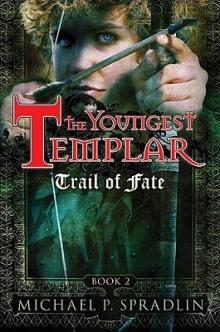 Trail of Fate
Trail of Fate Alcatraz
Alcatraz Every Zombie Eats Somebody Sometime
Every Zombie Eats Somebody Sometime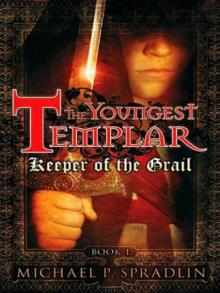 Keeper of the Grail tyt-1
Keeper of the Grail tyt-1 To Hawaii, with Love
To Hawaii, with Love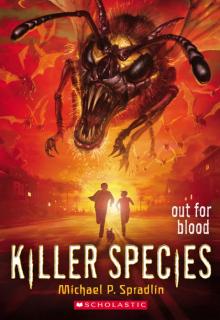 Out for Blood
Out for Blood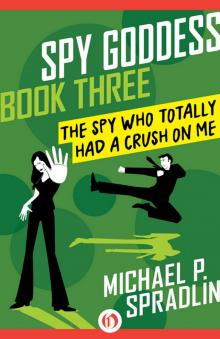 The Spy Who Totally Had a Crush on Me
The Spy Who Totally Had a Crush on Me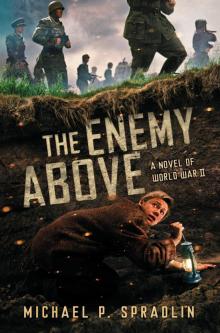 The Enemy Above
The Enemy Above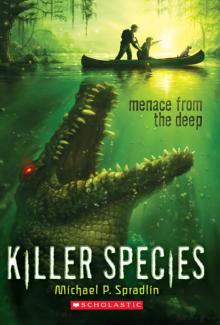 Menace From the Deep
Menace From the Deep It's Beginning to Look a Lot Like Zombies
It's Beginning to Look a Lot Like Zombies Feeding Frenzy
Feeding Frenzy 3 The Spy Who Totally Had a Crush on Me
3 The Spy Who Totally Had a Crush on Me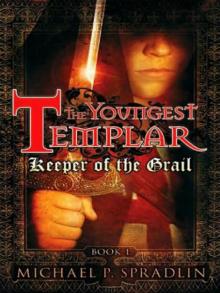 Keeper of the Grail
Keeper of the Grail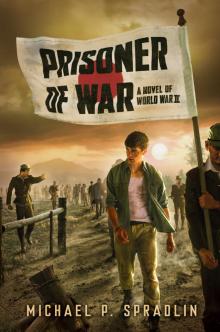 Prisoner of War
Prisoner of War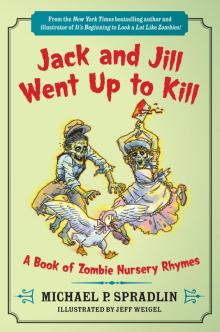 Jack and Jill Went Up to Kill
Jack and Jill Went Up to Kill Live and Let Shop
Live and Let Shop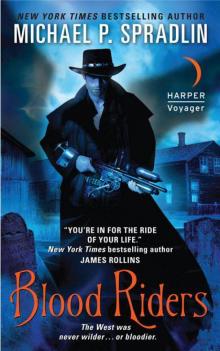 Blood Riders
Blood Riders Ultimate Attack
Ultimate Attack